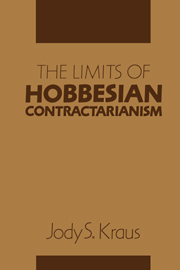Summary
In Leviathan, Thomas Hobbes constructs a theoretical apparatus that promises to unify the fields of human psychology, ethics, and political philosophy. Hobbes's grand project is to found an “objective science of moral philosophy,” firmly grounded on truths of human psychology, from which a moral obligation to obey an absolute political sovereign can be generated. Though such an ambitious and far-reaching theory usually attracts considerable and long-lasting attention, Hobbes's social contract theory seems to have been almost entirely dismissed by his contemporaries and largely ignored by political philosophers in the twentieth century until Rawls published A Theory of justice in 1971. Since then, interest in Hobbesian contractarianism has grown steadily. Alongside the critical discussion of Rawls's theory, a substantial body of contemporary Hobbesian scholarship has developed in both political and moral theory. In the last decade, this research has culminated in the publication of three major works inspired by Hobbes's social contract theory. This book attempts to provide an overarching and detailed critical analysis of these works in an effort to explore both the insights and limits of political and moral Hobbesian contractarianism.
Before presenting this analysis, however, I provide the backdrop from which these theories have emerged. My objective in this chapter is to introduce contractarian theory in general, to provide one view of why Hobbesian contractarianism is enjoying a contemporary renaissance in moral and political theory, and to anticipate some of the themes which emerge from the analysis in the subsequent chapters.
- Type
- Chapter
- Information
- The Limits of Hobbesian Contractarianism , pp. 1 - 46Publisher: Cambridge University PressPrint publication year: 1993



